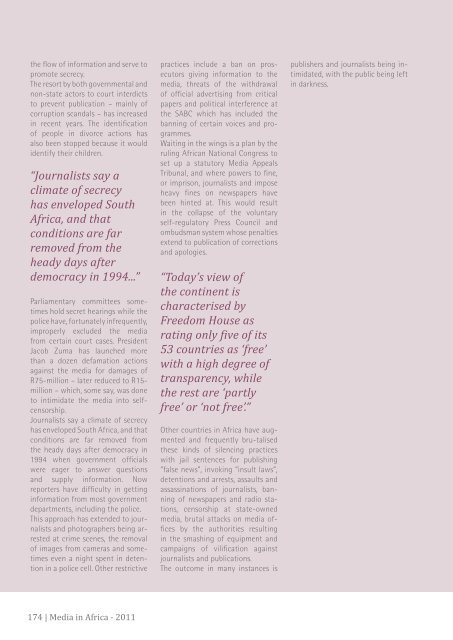Twenty years after the Windhoek Declaration on press freedom
Twenty years after the Windhoek Declaration on press freedom
Twenty years after the Windhoek Declaration on press freedom
Create successful ePaper yourself
Turn your PDF publications into a flip-book with our unique Google optimized e-Paper software.
<str<strong>on</strong>g>the</str<strong>on</strong>g> flow of informati<strong>on</strong> and serve to<br />
promote secrecy.<br />
The resort by both governmental and<br />
n<strong>on</strong>-state actors to court interdicts<br />
to prevent publicati<strong>on</strong> – mainly of<br />
corrupti<strong>on</strong> scandals – has increased<br />
in recent <str<strong>on</strong>g>years</str<strong>on</strong>g>. The identificati<strong>on</strong><br />
of people in divorce acti<strong>on</strong>s has<br />
also been stopped because it would<br />
identify <str<strong>on</strong>g>the</str<strong>on</strong>g>ir children.<br />
“Journalists say a<br />
climate of secrecy<br />
has enveloped South<br />
Africa, and that<br />
c<strong>on</strong>diti<strong>on</strong>s are far<br />
removed from <str<strong>on</strong>g>the</str<strong>on</strong>g><br />
heady days <str<strong>on</strong>g>after</str<strong>on</strong>g><br />
Parliamentary committees sometimes<br />
hold secret hearings while <str<strong>on</strong>g>the</str<strong>on</strong>g><br />
police have, fortunately infrequently,<br />
improperly excluded <str<strong>on</strong>g>the</str<strong>on</strong>g> media<br />
from certain court cases. President<br />
Jacob Zuma has launched more<br />
than a dozen defamati<strong>on</strong> acti<strong>on</strong>s<br />
against <str<strong>on</strong>g>the</str<strong>on</strong>g> media for damages of<br />
R75-milli<strong>on</strong> – later reduced to R15milli<strong>on</strong><br />
– which, some say, was d<strong>on</strong>e<br />
to intimidate <str<strong>on</strong>g>the</str<strong>on</strong>g> media into selfcensorship.<br />
Journalists say a climate of secrecy<br />
has enveloped South Africa, and that<br />
c<strong>on</strong>diti<strong>on</strong>s are far removed from<br />
<str<strong>on</strong>g>the</str<strong>on</strong>g> heady days <str<strong>on</strong>g>after</str<strong>on</strong>g> democracy in<br />
1994 when government officials<br />
were eager to answer questi<strong>on</strong>s<br />
and supply informati<strong>on</strong>. Now<br />
reporters have difficulty in getting<br />
informati<strong>on</strong> from most government<br />
departments, including <str<strong>on</strong>g>the</str<strong>on</strong>g> police.<br />
This approach has extended to journalists<br />
and photographers being arrested<br />
at crime scenes, <str<strong>on</strong>g>the</str<strong>on</strong>g> removal<br />
of images from cameras and sometimes<br />
even a night spent in detenti<strong>on</strong><br />
in a police cell. O<str<strong>on</strong>g>the</str<strong>on</strong>g>r restrictive<br />
practices include a ban <strong>on</strong> prosecutors<br />
giving informati<strong>on</strong> to <str<strong>on</strong>g>the</str<strong>on</strong>g><br />
media, threats of <str<strong>on</strong>g>the</str<strong>on</strong>g> withdrawal<br />
of official advertising from critical<br />
papers and political interference at<br />
<str<strong>on</strong>g>the</str<strong>on</strong>g> SABC which has included <str<strong>on</strong>g>the</str<strong>on</strong>g><br />
banning of certain voices and programmes.<br />
Waiting in <str<strong>on</strong>g>the</str<strong>on</strong>g> wings is a plan by <str<strong>on</strong>g>the</str<strong>on</strong>g><br />
ruling African Nati<strong>on</strong>al C<strong>on</strong>gress to<br />
set up a statutory Media Appeals<br />
Tribunal, and where powers to fine,<br />
or impris<strong>on</strong>, journalists and impose<br />
heavy fines <strong>on</strong> newspapers have<br />
been hinted at. This would result<br />
in <str<strong>on</strong>g>the</str<strong>on</strong>g> collapse of <str<strong>on</strong>g>the</str<strong>on</strong>g> voluntary<br />
self-regulatory Press Council and<br />
ombudsman system whose penalties<br />
extend to publicati<strong>on</strong> of correcti<strong>on</strong>s<br />
and apologies.<br />
democracy in 1994...” “Today’s view of<br />
174 | Media in Africa - 2011<br />
<str<strong>on</strong>g>the</str<strong>on</strong>g> c<strong>on</strong>tinent is<br />
characterised by<br />
Freedom House as<br />
rating <strong>on</strong>ly five of its<br />
53 countries as ‘free’<br />
with a high degree of<br />
transparency, while<br />
<str<strong>on</strong>g>the</str<strong>on</strong>g> rest are ‘partly<br />
free’ or ‘not free’.”<br />
O<str<strong>on</strong>g>the</str<strong>on</strong>g>r countries in Africa have augmented<br />
and frequently bru-talised<br />
<str<strong>on</strong>g>the</str<strong>on</strong>g>se kinds of silencing practices<br />
with jail sentences for publishing<br />
“false news”, invoking “insult laws”,<br />
detenti<strong>on</strong>s and arrests, assaults and<br />
assassinati<strong>on</strong>s of journalists, banning<br />
of newspapers and radio stati<strong>on</strong>s,<br />
censorship at state-owned<br />
media, brutal attacks <strong>on</strong> media offices<br />
by <str<strong>on</strong>g>the</str<strong>on</strong>g> authorities resulting<br />
in <str<strong>on</strong>g>the</str<strong>on</strong>g> smashing of equipment and<br />
campaigns of vilificati<strong>on</strong> against<br />
journalists and publicati<strong>on</strong>s.<br />
The outcome in many instances is<br />
publishers and journalists being intimidated,<br />
with <str<strong>on</strong>g>the</str<strong>on</strong>g> public being left<br />
in darkness.












